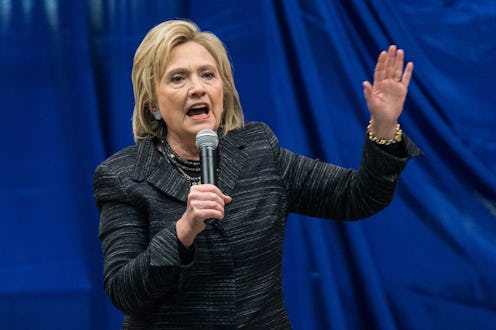News
Hillary's Closing Statement Spotlights Flint, MI
On Sunday night, Hillary Clinton, Bernie Sanders, and Martin O'Malley faced off in the fourth Democratic presidential primary debate, and the event lived up to it's billing. At the end, the house was brought down by Hillary Clinton's closing statement, which spotlighted the ongoing water contamination crisis in Flint, Michigan.
Everyone was expecting to see the candidates get a bit more aggressive with each other ― Clinton and Sanders in particular, as the polls in the crucial early voting states of Iowa and New Hampshire have tightened. And relative to the other debates, that definitely happened. In the past, Clinton had enough of a cushion in the polls that she could play things pretty close to the vest. Direct confrontations between the candidates were few, and when they came up, the tone rarely got too negative. Each debate has had a good number of moments of levity or collegiality here and there. But the circumstances have changed, with recent polls showing Sanders holding a reliable lead of about six points in Iowa.
But when it came time for her closing statement, Clinton took dead aim not at Sanders, but at a Republican: Rick Snyder, the Republican governor of Michigan, who's been embroiled in the harrowing Flint water crisis for months. Here's what she said, with a swell of moral force in her voice:
Well Lester, I spent a lot of time last week being outraged by what’s happening in Flint, Michigan, and I think every single American should be outraged. We’ve had a city in the United States of America where the population, which is poor in many ways, and majority African-American, has been bathing and drinking in lead contaminated water. And the governor of that state acted as though he didn’t really care. He had requests for help that he basically stonewalled. I’ll tell you what: if the kids in a rich suburb of Detroit had been drinking contaminated water, and being bathed in it, there would’ve been action.
So I sent my top campaign aide down there to talk to the mayor fo Flint, to see what I could do to help, and I issued a statement about what we need to do, and then went on a TV show and I said it was outrageous that the governor hadn’t acted, and within two hours he had. I want to be a president who takes care of the big problems and the problems that are affecting the people of our country every day.
Sunday was the last chance that Democratic voters in Iowa had to get a look at Sanders, Clinton, and O'Malley before their caucus on Feb. 1, and that's been a topic of some criticism. The Democratic National Committee only scheduled six primary debates this cycle to the Republicans' 12, which ostensibly makes it harder for an underdog campaign like Sanders' to gain traction. But thus far, he's done incredibly well ― he's far surpassed the expectations of the conventional political wisdom of six months ago.
That said, he remains a decided underdog by virtue of Clinton's still-staggering leads in cornerstone primary states like South Carolina and Florida. And while it remains to be seen whose performance in Sunday night's debate will go down as the more successful one ― both scored some pretty decisive blows, with Sanders hitting Clinton hard on her Wall Street ties, and Clinton striking at Sanders’ past criticisms of President Obama ― Clinton’s closing statement, which focused on the plight of an underserved community under downright unacceptable circumstances, was definitely one of the high points of her night.
